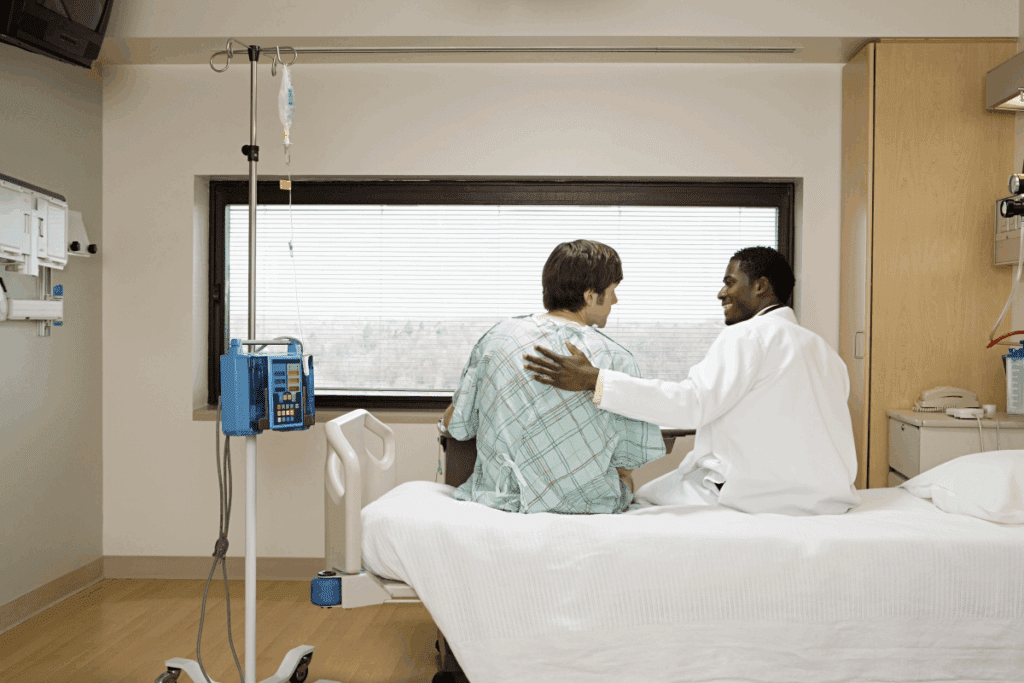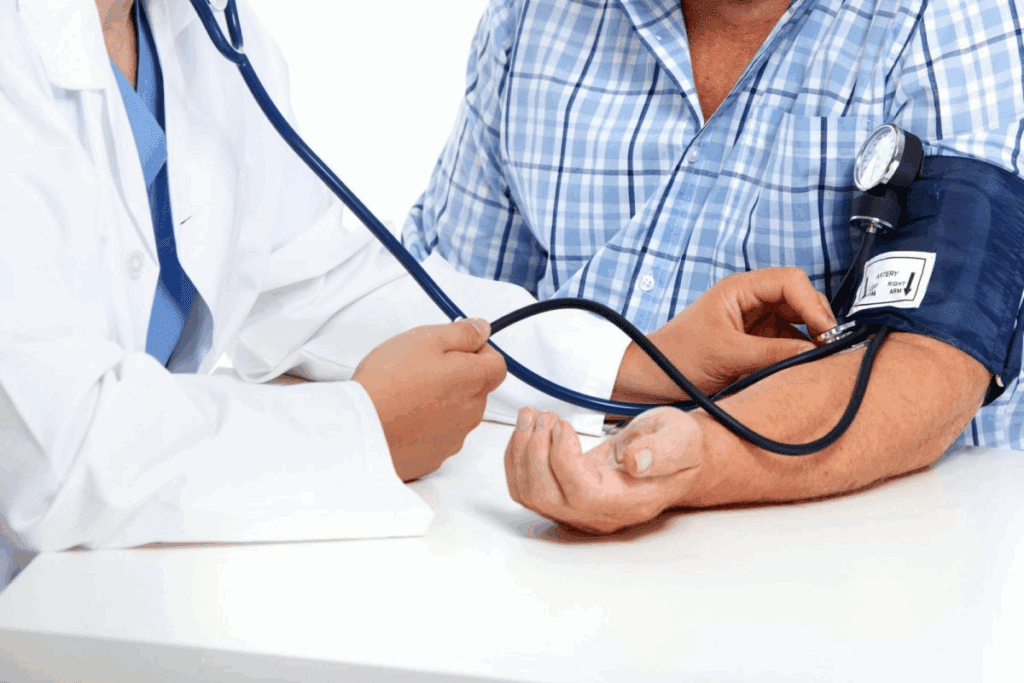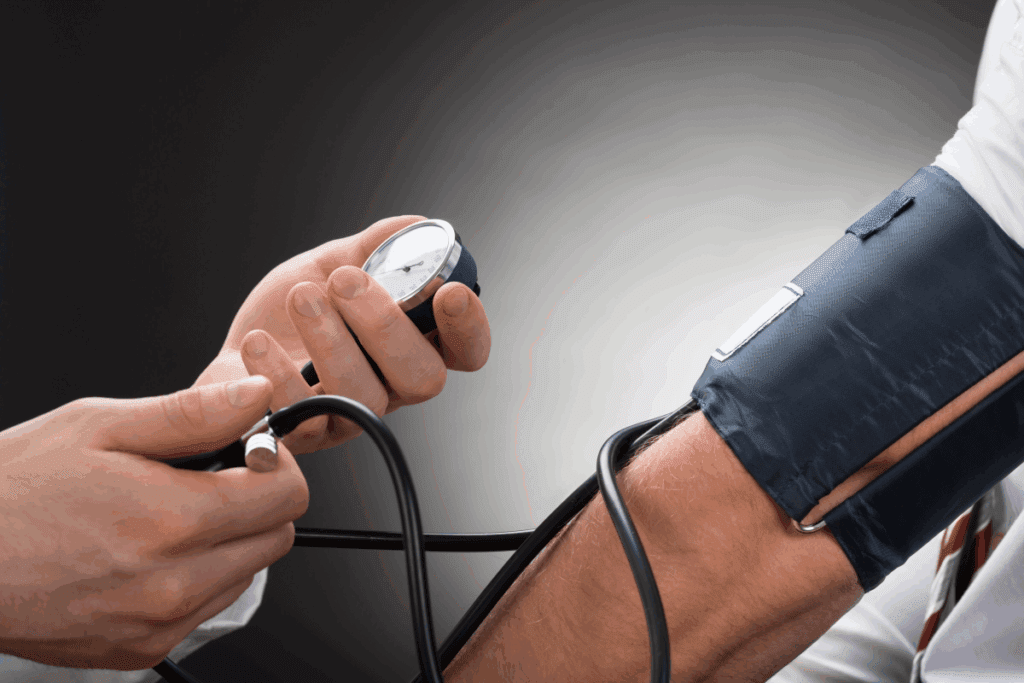Last Updated on November 25, 2025 by Ugurkan Demir

High blood pressure, or hypertension, is often called the “silent killer.” It usually doesn’t show any clear signs, even when it reaches very high levels.
Find out can you feel high blood pressure and the symptoms you should notice.
At Liv Hospital, we know how important it is to spot the early signs of high blood pressure. While many people don’t feel anything, some might get headaches, feel dizzy, or get very tired. These symptoms can happen when blood pressure gets very elevated.
It’s vital to get high blood pressure checked by a doctor. It can happen to anyone, no matter their age. Our team at Liv Hospital is here to help. We use the latest medical knowledge to keep you safe and healthy.

It’s key to recognize and manage high blood pressure to avoid serious health risks. High blood pressure, or hypertension, can lead to severe health problems if not controlled.
Hypertension is when your blood pressure is too high in your arteries. It’s a big risk for heart disease, stroke, and kidney problems. Understanding hypertension is important because it often doesn’t show symptoms until it’s too late.
Blood pressure is checked with a sphygmomanometer. It gives two numbers: systolic and diastolic. The systolic number is the higher one, showing pressure when the heart beats. The diastolic number is the lower one, showing pressure between beats. Doctors usually take two or more readings to diagnose properly.
Blood pressure is divided into ranges. Normal blood pressure is below 120/80 mmHg. Elevated blood pressure is 120-129/80 mmHg. Stage 1 hypertension is 130-139/80-89 mmHg. Stage 2 hypertension is 140 or higher/90 or higher mmHg. Knowing these ranges helps you see if you have high blood pressure and what to do.
Getting your blood pressure checked by a doctor is a key step in managing hypertension. By understanding your blood pressure, you can take steps to keep your heart healthy.

High blood pressure is often called a “silent killer.” It usually doesn’t show symptoms until it has caused a lot of damage. This makes it hard for people to know they have it without getting their blood pressure checked regularly.
Hypertension often goes unnoticed because it doesn’t show clear signs in the early stages. Many people with high blood pressure feel fine, even as their blood vessels are being damaged.
The body can adapt to high blood pressure, which is why it doesn’t show symptoms. But, this doesn’t mean it’s not causing harm. If left untreated, high blood pressure can lead to serious problems like heart disease, stroke, and kidney disease.
While many people with hypertension don’t show symptoms, some might. Symptoms can include headaches in the morning, dizziness, or feeling very tired.
When symptoms do appear, it depends on several things. These include how high the blood pressure is, how fast it’s rising, and how well the body can handle it.
| Symptom | Description |
| Headaches | Often occur in the morning, can be severe |
| Dizziness | May be accompanied by lightheadedness or vertigo |
| Fatigue | Feeling tired or lacking energy, even after rest |
People experience symptoms of high blood pressure in different ways. Some might not have any symptoms at all. Others might have a variety of symptoms that can be mild or severe.
Many things can affect how symptoms are felt. These include overall health, lifestyle, and other medical conditions. That’s why it’s important to regularly check blood pressure to catch and manage hypertension early.
High blood pressure often doesn’t show symptoms. But, some people might feel certain sensations that need attention. These feelings can be different in how strong and how often they happen, and they might mean it’s time to see a doctor.
Headaches are a common feeling linked to high blood pressure. These headaches can be very bad in the morning.
The exact reason for these headaches isn’t always known. But, they’re thought to be linked to how the body reacts to high blood pressure.
Some people with high blood pressure might feel pounding in their chest, neck, or ears. This feeling is like their heart is beating hard or in an odd way.
These feelings can be scary and might be because of the extra pressure on blood vessels and the heart’s hard work to pump blood.
High blood pressure can also mess with your vision. You might see things blurry or have other vision problems. This happens because of the pressure on blood vessels in your eyes.
| Symptom | Description | Possible Cause |
| Headaches | Throbbing or pulsating, often in the morning | Elevated blood pressure |
| Pounding Sensations | Feeling of heart beating forcefully | Increased pressure on blood vessels |
| Visual Disturbances | Blurred vision or other visual issues | Pressure on blood vessels in the eyes |
It’s important to know these common feelings linked to high blood pressure. If you’re feeling any of these, you should talk to a doctor right away.
High blood pressure can show up in different ways, like affecting our balance and how we feel. It might not always show symptoms, but when it does, it can be serious. This is true when it affects blood flow to the brain.
Many people with high blood pressure feel dizzy. This happens because the body tries to adjust to the higher pressure. It does this by changing the heart rate and blood vessel size. But these changes can sometimes reduce blood flow to the brain, making us feel dizzy or lightheaded.
Mechanisms Behind Dizziness: The inner ear has a system called the vestibular system, which helps us balance. High blood pressure can harm the blood vessels that supply this area. This can mess with our balance and cause dizziness.
Nausea can also happen with high blood pressure, often when it spikes suddenly. When blood pressure goes up fast, it can stress the body, including the stomach. This stress can make us feel nauseous.
It’s essential to note that while nausea is uncomfortable, it can be a warning sign. For people with high blood pressure, nausea might signal a bigger problem.
Dizziness and nausea can be linked to high blood pressure, but they can also mean something serious is wrong. For example, a sudden and big jump in blood pressure can cause a hypertensive crisis. This is marked by severe headache, confusion, and even losing consciousness. If you’re feeling dizzy or nauseous and have other severe symptoms, get help right away.
Recognizing the Signs: Know what’s normal for your body and watch for any changes. If you’re feeling dizzy or nauseous and it’s not normal, or if you have other worrying symptoms, see a doctor.
Does high blood pressure make you tired? It’s all about how it affects our energy. High blood pressure, or hypertension, can really impact our health and energy.
High blood pressure can block blood flow to the brain and other important organs. This can make us feel tired all the time. When our heart has to work harder, we get less energy.
Fatigue can be caused by many things, making it hard to find the real cause. But, there are some differences in fatigue from high blood pressure and other issues.
Fatigue and blood pressure are linked in a cycle. High blood pressure can make us tired, and feeling tired can make blood pressure worse. It’s a tough cycle to break.
To stop this cycle, managing high blood pressure is key. Making lifestyle changes and taking medication if needed can help. By controlling blood pressure, we can feel less tired and live better.
For those with high blood pressure, mornings can be tough. It’s important to know the signs and how to handle them. This knowledge helps manage blood pressure and keeps you feeling good.
Blood pressure changes throughout the day. For many, it goes up in the morning. This is because our body’s natural rhythm gets ready for the day by increasing blood pressure and heart rate.
Hormonal changes also play a part. Cortisol and adrenaline, released in the morning, help control blood pressure. They can make it go up when you wake up.
People with high blood pressure might feel different in the morning. Some common signs include:
These symptoms can be serious. It’s key to check your blood pressure often and talk to a doctor about any unusual feelings.
Checking blood pressure in the morning is very helpful. It shows the highest levels and how they affect your body.
Doing this regularly helps see if treatments and lifestyle changes work. By tracking blood pressure at the same time each day, you can spot patterns and make better choices for your health.
| Time of Day | Blood Pressure Reading | Notes |
| Morning | 140/90 mmHg | Before medication |
| Evening | 130/80 mmHg | After medication |
High blood pressure can cause vague symptoms. These might include feeling tired, unwell, or just not right without a clear reason.
These symptoms can be hard to figure out. They might need careful watching and a doctor’s help to find out why.
High blood pressure can affect your mind too. It can lead to anxiety and depression. Managing this condition can also impact your mental health and life quality.
Doctors should treat both the physical and mental sides of high blood pressure. This way, they can help more fully.
For some, high blood pressure makes them feel unwell. But it’s not the same for everyone. The symptoms and how bad they are can vary a lot.
Knowing the symptoms and effects of high blood pressure is key. It helps manage the condition better and improves your overall health.
Hypertension affects more than just your body. It also impacts your emotional health. We’ll look at how it changes your life, from physical feelings to emotional shifts.
People with hypertension share their experiences in different ways. Some feel generally unwell, while others talk about headaches or dizziness. The subjective nature of these experiences makes it challenging to pinpoint common symptoms. But, it’s key for doctors to understand these stories.
“I often feel a heaviness in my chest, specially after physical activity,” said one patient. “It’s not always painful, but it’s uncomfortable and makes me anxious about my condition.”
These personal stories show why it’s vital to consider the patient’s feelings when managing hypertension.
Hypertension can show itself in small ways that are easy to miss. These might include mild fatigue, occasional headaches, or slight dizziness. Being aware of these subtle signs is key for early detection and management.
The emotional side of living with hypertension is significant. Anxiety, fear of complications, and stress from managing treatment can greatly affect your life. Addressing these emotional aspects is as important as managing the physical symptoms.
| Emotional Impact | Common Experiences |
| Anxiety | Worry about future health complications |
| Fear | Fear of having a heart attack or stroke |
| Stress | Stress from managing medication and lifestyle changes |
Understanding the subjective experience of hypertension is essential for good care. By recognizing both physical and emotional impacts, doctors can offer better support.
It’s important to know the severe symptoms of high blood pressure. High blood pressure, or hypertension, can show signs that need quick medical help. These symptoms can lead to serious health issues if not treated right away.
A hypertensive crisis is when blood pressure gets too high. This can harm organs. Look out for these warning signs:
High blood pressure can damage organs. This can show in different ways. Look out for these symptoms:
If you see symptoms of a hypertensive crisis or organ damage, get help fast. Call 911 or your local emergency number if you have:
Quick medical help can make a big difference in severe cases. If you’re not sure about your symptoms, it’s better to get medical care.
Managing high blood pressure starts with regular monitoring and tracking of blood pressure. Knowing your blood pressure patterns helps you and your doctor make better treatment choices.
Checking your blood pressure at home is easy and helpful. To get accurate readings, follow these steps:
Keeping a symptom journal is also important. Write down any symptoms you have, like headaches or dizziness, and your blood pressure readings. This can help you and your doctor manage your condition better.
Today, there are many digital tools and apps for tracking your blood pressure and symptoms. These tools give you a detailed view of your health over time. They make it easier to share your health data with your doctor. Look for an app that is easy to use and has features like:
Using these tools and methods, you can actively manage your high blood pressure. This can greatly improve your health.
We’ve looked into the challenges of high blood pressure. It’s important to understand its silent nature and its symptoms. To live well with hypertension, managing it properly, monitoring it regularly, and making healthy lifestyle changes are key.
Knowing the symptoms like headaches, dizziness, and fatigue is the first step. Taking action early can help manage the condition. Keeping track of blood pressure and symptoms in a journal can offer insights for better management.
With the right strategy, people with hypertension can enjoy active and fulfilling lives. We urge readers to collaborate with their healthcare providers. Together, they can create a personalized plan to manage blood pressure. This will improve overall well-being and quality of life.
High blood pressure often doesn’t show symptoms. But, when it does, you might feel headaches, dizziness, or nausea. You could also have pounding in your chest, neck, or ears, and see things differently.
Yes, it can. High blood pressure affects blood flow and balance. If you’re dizzy a lot or it’s really bad, get help right away.
Yes, it can. Hypertension can make you tired. This is because your body is working hard to deal with the high blood pressure.
It peaks in the morning because of your body’s natural rhythm. Morning hormones also play a part. Checking your blood pressure in the morning is very helpful.
Yes, it can. High blood pressure can make you feel sick, worse when it spikes. If you’re feeling really sick or dizzy, get help.
You can use home monitors, keep a journal, or apps. These tools help you track your blood pressure easily.
Severe symptoms include a bad headache, confusion, chest pain, and signs of organ damage. If you see these, call for help or go to the hospital right away.
Yes, it can. Hypertension can make you feel sick in general. It can also cause anxiety or stress.
Hypertension can make you feel tired, affect your energy, and cause stress. These can change your daily life and how you feel about it.
It can feel different for everyone. But, common feelings include a pounding or throbbing, headaches, or feeling sick in general.
National Center for Biotechnology Information. (2025). What Does High Blood Pressure Feel Like Common. Retrieved from https://pmc.ncbi.nlm.nih.gov/articles/PMC11344628/
Subscribe to our e-newsletter to stay informed about the latest innovations in the world of health and exclusive offers!